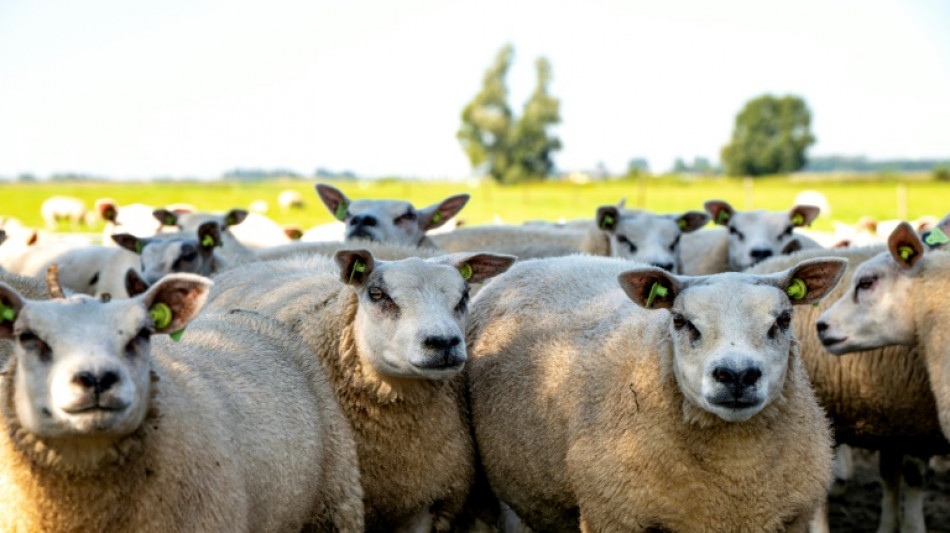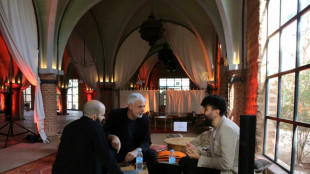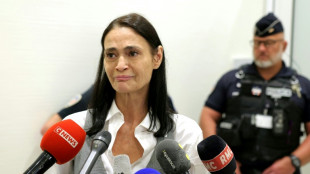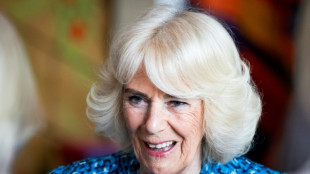
-
 Iran Nobel winner released for three weeks, 'unconditional' freedom urged
Iran Nobel winner released for three weeks, 'unconditional' freedom urged
-
Red Cross marks record numbers of humanitarians killed in 2024

-
 Johnson's Grand Slam 'no threat', says World Athletics boss Coe
Johnson's Grand Slam 'no threat', says World Athletics boss Coe
-
Qatar's emir and UK's Starmer talk trade as state visit ends

-
 Cuba suffers third nationwide blackout in two months
Cuba suffers third nationwide blackout in two months
-
Russia, Ukraine to send top diplomats to OSCE summit in Malta

-
 Spanish royals to attend memorial service for flood victims
Spanish royals to attend memorial service for flood victims
-
LPGA, USGA new policy requires female at birth or pre-puberty change

-
 Stick to current climate change laws, US tells top UN court
Stick to current climate change laws, US tells top UN court
-
British Museum chief says Marbles deal with Greece 'some distance' away

-
 Pope Francis receives electric popemobile from Mercedes
Pope Francis receives electric popemobile from Mercedes
-
Gaza civil defence: thousands flee Israeli strikes, evacuation calls

-
 Trump names billionaire private astronaut as next NASA chief
Trump names billionaire private astronaut as next NASA chief
-
Pidcock to leave INEOS Grenadiers at end of season

-
 Seoul stocks weaken, Paris advances despite political turmoil
Seoul stocks weaken, Paris advances despite political turmoil
-
South America summit hopes to seal 'historic' trade deal with EU

-
 DAZN awarded global TV rights for Club World Cup
DAZN awarded global TV rights for Club World Cup
-
Top executive shot dead outside New York hotel

-
 Vaping while still smoking unlikely to help quitters: study
Vaping while still smoking unlikely to help quitters: study
-
British Museum chief says Parthenon Marbles deal with Greece 'some distance' away

-
 'Creating connections': Arab, African filmmakers gather at Morocco workshops
'Creating connections': Arab, African filmmakers gather at Morocco workshops
-
Iran frees Nobel winner for three weeks, sparking calls for 'permanent' release

-
 Brazil's Minas cheese gets added to UNESCO list
Brazil's Minas cheese gets added to UNESCO list
-
Top US executive shot dead in New York City: media

-
 Trump's nominee to run Pentagon hangs by a thread
Trump's nominee to run Pentagon hangs by a thread
-
GM announces more than $5 bn hit to earnings in China venture

-
 World chess champ Ding, teen challenger tied past halfway mark
World chess champ Ding, teen challenger tied past halfway mark
-
Georgia police raid opposition offices as PM vows to curb protests

-
 S. Korea opposition begins push to impeach president
S. Korea opposition begins push to impeach president
-
Syrian army fights rebel offensive with counterattack

-
 France court upholds Polanski acquittal in defamation case
France court upholds Polanski acquittal in defamation case
-
UK bans daytime TV ads for cereals, muffins and burgers

-
 Palace's Guehi to face no formal action over 'Jesus' message on rainbow armband
Palace's Guehi to face no formal action over 'Jesus' message on rainbow armband
-
UK faces trade balancing act with Trump, EU

-
 Iran releases Nobel Peace laureate Mohammadi on medical leave: lawyer
Iran releases Nobel Peace laureate Mohammadi on medical leave: lawyer
-
UNESCO grants heritage status to Aleppo soap as Syria war flares

-
 Ghana's illegal mining boom seeps into presidential election
Ghana's illegal mining boom seeps into presidential election
-
Inconsistent Spurs 'progressing in all aspects': Postecoglou

-
 France's Orano says Niger junta controls uranium firm
France's Orano says Niger junta controls uranium firm
-
Seoul stocks weaken, Paris edges up tracking political turmoil

-
 China reports warmest autumn since records began
China reports warmest autumn since records began
-
French marine park to close over law banning killer whale shows

-
 Thousands march demanding S. Korea president resign over martial law debacle
Thousands march demanding S. Korea president resign over martial law debacle
-
Taiwan romance novelist Chiung Yao dies at 86

-
 In Angola, Biden promises to invest differently to China
In Angola, Biden promises to invest differently to China
-
Syrian army launches counteroffensive against rebels

-
 Evenepoel says 'long journey' ahead after postal van collision
Evenepoel says 'long journey' ahead after postal van collision
-
South Korea's day of rage as Yoon's martial law founders

-
 UK police question killer nurse Letby over further baby deaths
UK police question killer nurse Letby over further baby deaths
-
Cameroon curator Kouoh is first African woman to lead Venice Biennale


Bluetongue anguish for Dutch farmers
One sheep dribbles, another limps, a third can barely stand: the bluetongue virus is causing havoc for Dutch farmer Erik van Norel, who thought he had seen the back of it.
Still recovering from the impact of the virus last year, the 41-year-old thought the nightmare was finally over -- then bluetongue staged a comeback on his farm.
Bluetongue is a non-contagious, insect-borne viral disease that affects sheep and cows but not pigs or horses. It is difficult to control once it takes hold.
In September 2023, when the BTV-3 strain of the virus broke out in the Netherlands, Van Norel rounded up his ill animals and transported them on his quad bike to the stable.
Some died within 12 hours. He lost 80 animals in total, roughly three quarters of the sheep that fell sick.
"The situation was desperate. There was nothing I could do," he told AFP, surrounded by his flock in Oosterwolde, in the north of the Netherlands.
Symptoms include excessive salivation, the swelling of lips, tongue, and jaw, and the loss of offspring for pregnant animals, in proportions varying from farm to farm.
Unlike bird flu for example, an animal infected with the virus is not automatically slaughtered.
Bluetongue is rarely fatal for cows, but leads to a dramatic drop in milk production.
The virus poses no danger to human health.
Dutch authorities have registered outbreaks of the virus in 6,384 places, with the rate steadily rising.
However, farming union LTO says this is hugely underestimated, as farmers are no longer taking blood samples from all infected animals.
The virus has also been recorded in France, Belgium and Germany. Nearly 1,200 Belgian farms are affected, according to figures out Tuesday, a tripling in three weeks.
France is dealing with an "explosion" of cases that have quadrupled in eight days, according to authorities at the agriculture ministry.
And in Germany, officials have detected 3,212 cases by August 22, also a concerning rate of growth.
- 'She's dribbling a lot' -
Van Norel says he is now battling through "season two" of the bluetongue disaster but thanks to vaccination, his animals are less sick than last year.
Nevertheless, the impact on his farm is clearly visible.
He approaches one sheep that is staying away from the rest of the flock.
"The mouth is very sensitive, you can see she is hardly eating and she is getting very thin," he said.
"She's dribbling a lot, she's also had diarrhoea. All the symptoms show that she is sick," concluded Van Norel.
But he thinks this particular sheep will survive, but is not so sure for six others taken to the "sick bay" in a meadow behind the stable. They have recovered but are now suffering from complications.
Swollen legs prevent them from walking or even standing upright. Those who don't recover are put down "out of respect for the animals," Van Noren.
Vaccination does not stop the animals contracting the disease but eases the symptoms. Around 10 percent of his sheep are dying from bluetongue, compared to 75 percent last year.
- 'Bankrupt' -
Dutch farmers have three vaccines available. The government sped up approvals before the insects that carry the disease became more active over the summer.
But LTO points out that all the costs, from buying the vaccine to vet fees, are borne by the farmers.
"The government has done its job with the vaccines but, given the current social impact on sheep farmers and milk producers, we want the ministry to do more," said Heleen Prinsen, animal welfare official at LTO.
"In Germany, France and Denmark, farmers get a payment for the vaccines," Prinsen told AFP, urging the European Union to come up with a joint response to the virus.
It is too early to put a figure on the total damage to the industry, she said. But it is sure that it represents yet another "tough financial hit" for farmers.
A man as gentle as a lamb, Van Norel inherited the farm from his uncle and is passionate about his job.
But he says that bluetongue cost him "ten of thousands of euros" last year, which had a "huge impact" on his business.
He managed to absorb the cost but he is not sure he can take many more episodes of the virus. "That will mean going bankrupt," he said.
R.Adler--BTB


